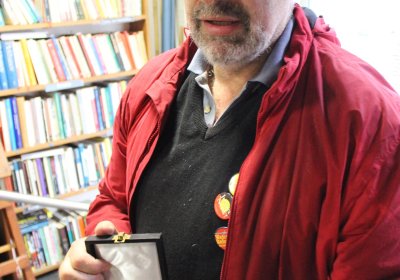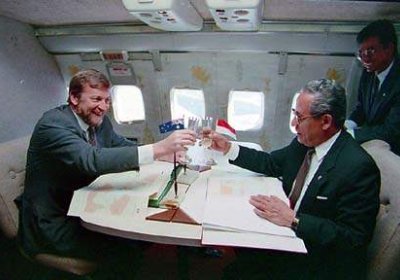Stephen Langford, long term solidarity activist with Timor Leste and secretary of the Australia East Timor Association NSW in the 1980s and 1990s, was awarded the Order of Timor Medal in a special ceremony in Maliana, Timor Leste, on May 20 as part of Independence Day celebrations.
The Indonesian government illegally occupied Timor Leste for 24 years from 1975 to 1999. The Australian government was complicit in the invasion, never opposing the actions of the Indonesian government, despite five Australian journalists being killed by the Indonesian military just before the invasion.
Timor-Leste (East Timor)
Massacre is an explosive theatre work about the politics and violence of East Timor. Produced by Stone/Castro (Australia) and Colectivo 84 (Portugal), it features John Romao as “Timor” and Paulo Castro as “East”.
They work with “weapons of grotesque, sarcasm and a thrash metal soundtrack to create a scenic, hypnotic and dangerous game. The mutant metamorphosis of Australia, Indonesia and Portugal make for an in-your-face confrontation to the East Timor crisis.”
Many see Australia as a small power dependent on British and then US power for protection, but it is important to note that Australia has its own imperialist agenda it pushes the Pacific region.
From the late 19th century to today, Australia's ruling class has been finding ways of extending its influence on nearby countries. It has even succeeded, if only temporarily, in gaining colonial possessions.
This began even before federation in 1901, as the new capitalist class, having accumulated capital from the gold rushes in the mid-19th century, was looking for outlets for investment.
Beloved Land: Stories, Struggles & Secrets From Timor-Leste
Gordon Peake
Scribe, 2013
250 pages, $29.95 (pb)
East Timor is a tale of two statistics, says Gordon Peake in Beloved Land, his engaging blend of history, memoir and travelogue about the former Portuguese and Indonesian colony.
One of the world's poorest nations, East Timor ranks a lowly 120th of 169 countries on the United Nations Human Development Index, but scores high on corruption at 15th on the World Bank’s business transparency report.
East Timor has taken Australia to an international court in an effort to take control over large oil and gas reserves in the Timor Sea.
But this isn't the only time the Timorese have come up against Australia ― which has sought to impose its interests on the former Portuguese colony in recent decades.
The Portuguese had a presence in Timor from 1509, trading sandalwood, converting Timorese to Catholicism and fighting against the Dutch for control. In 1859, the Treaty of Lisbon finally stopped the colonial conflict, dividing the island into the Dutch western half and Portuguese east.
Australian activists have written to Prime Minister Tony Abbott calling on him to recognise East Timor's rights under international law to oil and gas resources in the Timor Sea.
The Melbourne-based Timor Sea Justice Campaign is calling on Australia to “enter discussions about the establishment of permanent maritime boundaries in accordance with current international law. In situations such as this, current international law overwhelmingly favors a ‘median line’ solution – a line halfway between the two coastlines.”
AID/WATCH, an independent monitor of Australia’s aid and trade, released the statement below on December 4, in response to allegations of AusAID involvement in spying on the East Timorese government.
***
AID/WATCH has responded to the allegation that Australian government agencies, including AusAID, were involved in spying on the East Timorese cabinet room during sensitive meetings about oil and gas negotiations.
When East Timor won its independence from Indonesia in 1999, the country's medical infrastructure in rural areas was almost non-existent.
When then-Cuban President Fidel Castro heard about the problem at a regional summit, he offered to send Cuban doctors free of charge — as many as were needed.
So began the largest Cuban medical assistance program outside Latin America.
In 2010, after a six year program of study in Cuba, the first of nearly 500 East Timorese medical students graduated and took up their posts in East Timorese villages and towns.
Secrecy: The Key to Independence
Laura S. Abrantes & Beba Sequeira
Asia Pacific Support Collective Timor-Leste,
Dili 2012, 102 pp.
This is a book you should turn to whenever you think activism is too hard.
Twelve women from the remote areas of Timor-Leste (East Timor) tell how they fought for their nation's independence. In the 24-year war from 1975 to 1999, official estimates are that 18,600 people were killed by conflict and 84,200 died of hunger and disease.
Eighty four protesters were arrested at a May Day protest in Dili. The 84 were placed in a detention centre.
More than 100 protesters had marched to the Hotel Timor, a four star hotel in Dili, on May 1 to demand a pay rise and to stop sackings of local staff. Four staff of the hotel had recently been dismissed after being accused of stealing.
The demonstrators chose May 1, the International Workers' Day, to express their concerns and demand their rights.
Czech writer Milan Kundera's truism, "the struggle of people against power is the struggle of memory against forgetting", described East Timor.
In October, the Sydney branch of the Australia-Cuba Friendship Society (ACFS) toured Dr Merita Armindo Monteiro, an East Timorese doctor trained for free in Cuba. Armindo Monterio is also an activist in the Timor Leste-Cuba Friendship Association.
Since 2004, Cuba has undertaken a large-scale medical training program for East Timor and sent hundreds of Cuban medical personnel to work on the island. Cuban medical collaboration in the region has since been extended to Kiribati, Nauru, Vanuatu, Tuvalu and the Solomon Islands. Papua New Guinea may soon benefit from Cuba’s generosity as well.
- Previous page
- Page 3
- Next page








